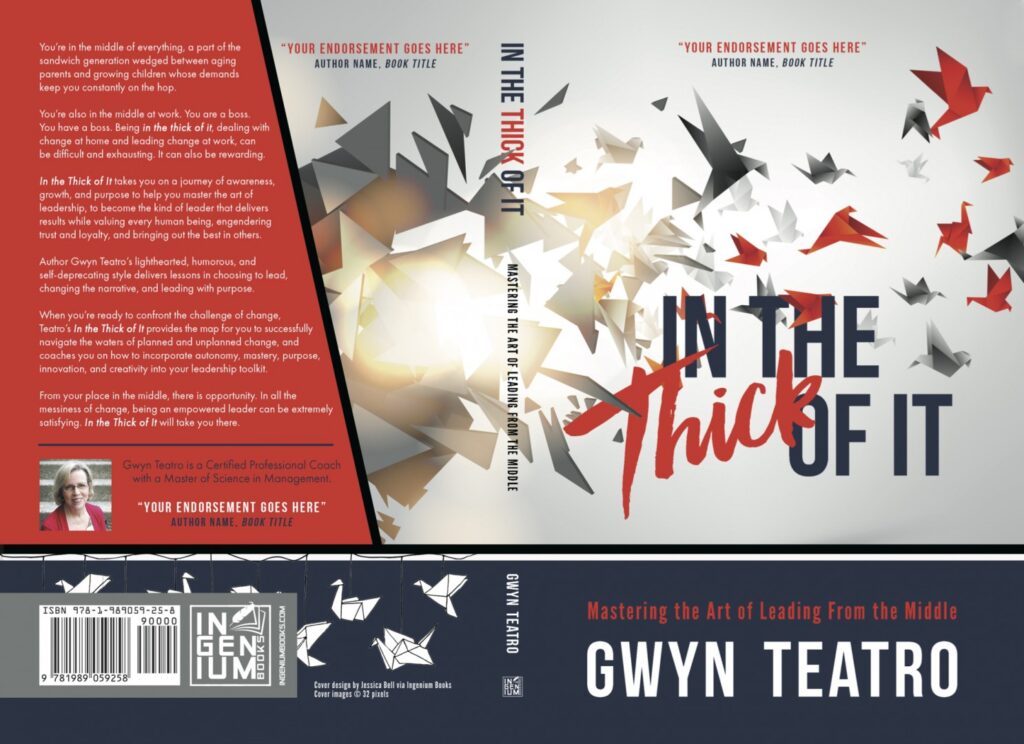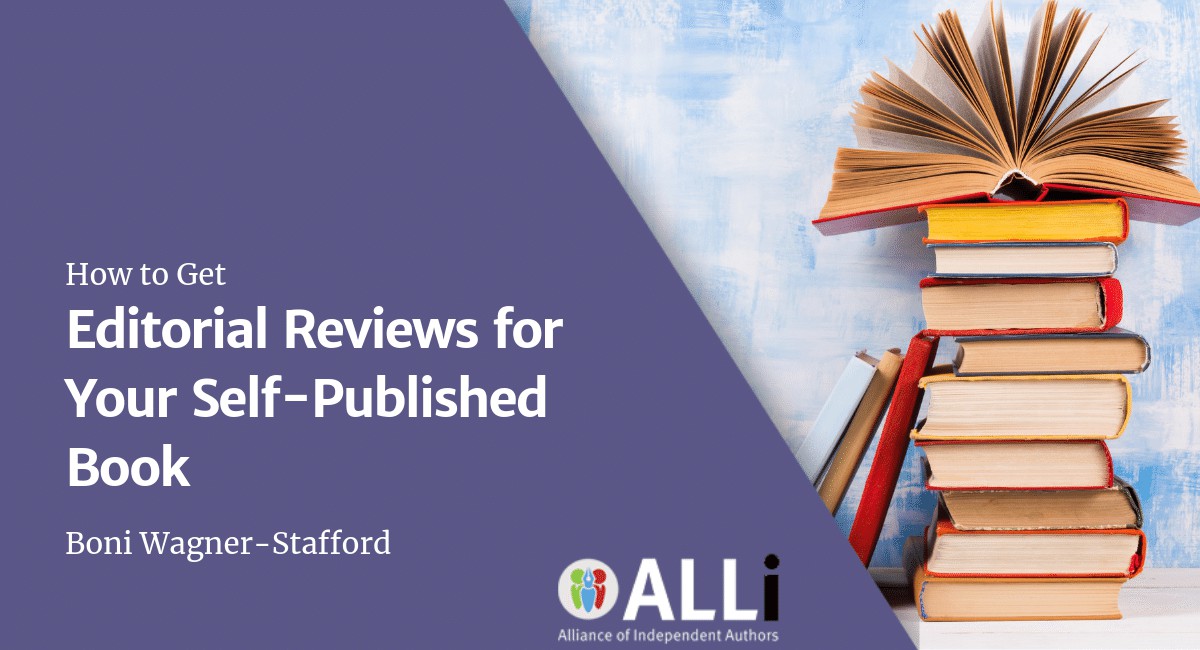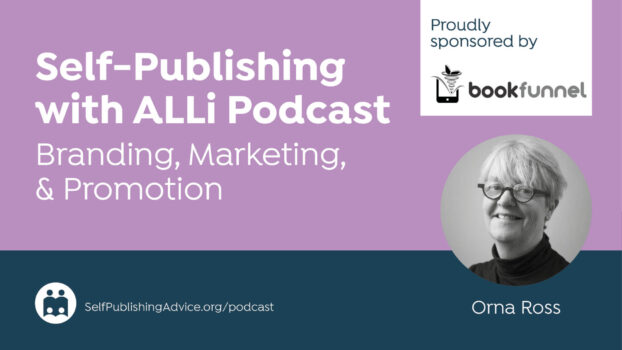Who says it's impossible to get editorial reviews for your self-published book? Granted, it may not seem easy, and as indie authors we may not have the established relationships with endorsers that traditional publishers have. But as Boni Wagner-Stafford explains, that's no reason not to try.
Let's clarify what we're talking about when we say “editorial reviews.” Editorial reviews, also called endorsements, are those glowing comments you find on front covers, back covers, inside in the front matter, and on your book's page with the distributor/retailer (e.g. Amazon). These endorsements are often from people working for big media outlets (New York Times, Guardian), famous, notable, or those with lots of credibility with your target reader. Given they confer credibility, social proof, and confidence in the reader experience promised by the book, why wouldn't you try to get editorial reviews for your self-published book?
How to Go About Getting Editorial Reviews for Your Self-Published Book
In this case I don't believe it matters what genre you are writing in — the process is the same.
1. Decide Who You Want on Your Cover
It's dream time! In your wildest dreams, who would you want to feature with editorial reviews for your self-published book? Think about that space on the front cover of your book telling the world it's a great read. This is the most important step. We might feel like we shouldn't ask the Margaret Atwoods or Jeff Bezos or whomever is the most famous guru relative to your reader audience, because, well, who are we, anyway?
Toss that thinking! Reach high! Go hard or go home, I used to always say before I got too tired to go too hard for too long :-).
When I was in my twenties, working for the telephone company, I was tasked with organizing a celebration for the end of our sales competition. I suggested we ask our professional football team (Canadian/American football, not soccer) to send representatives and bring giveaways we could use as prizes. Everyone said I was crazy and would be wasting my time. “Why would they come to us?” they all asked. Guess what? We had half a dozen team members from the football team in our offices for three hours one morning, and they brought autographed balls, shirts, they let us take a gazillion pictures with them and everything. It was a big hit. And it all happened because I wasn't afraid to ask.
What's the worst that can happen? Maybe they won't respond to your request. Maybe they'll say no. So what? Maybe they will! An author I'm working with even has actor Tom Hanks on her editorial request list. And not just because she's a huge Tom Hanks fan: she actually knows he is deeply interested in her subject matter related to World War II.
So with a big-blue-sky attitude, pinpoint your perfect endorser and then think in expanding concentric circles about similar people whose names you'd love to see next to an editorial review for your self-published book.
2. Find Those Who've Endorsed Similar Books
Now do a category search for books that are similar to yours. Continuing from the theme above, don't limit yourself to books you deem to be of the same profile as yours. If your thriller will compete with Lee Child's Jack Reacher series, check his books for the editorial reviews. Make notes of who has reviewed them, whether they are affiliated with a particular organization, and in many cases you'll have to follow that with a bit of research about who each person is if it isn't already obvious.
3. Identify Influencers Related to Your Genre, Book, Industry, or Subject
If you're a nonfiction author, this could be a leader doing good work in the same or similar field, someone whose work you have quoted or cited, perhaps someone who has published a competing book (asking competitors is not verboten!). If you're a fiction author, this could be leaders of the community or region in which your novel is set, for example. In many of these cases, remember that with your aggressive marketing tactics there's an exposure benefit to them. It's in their best interest.
4. Get All Information Into a Spreadsheet
You had to know it was going to come down to a spreadsheet, right? Sigh. You could use a project management tool like Asana or Hubspot (free version) or Slack or… good ol' Excel. This part isn't magic, but I find it pays to be organized. You'll want columns for name, company, email address, social media handles, mailing address, which book(s) they've reviewed, and a column or space to add notes about your communication. Like, when they tell you they'll be happy to provide editorial reviews for your self-published book, and they'll get back to you in two weeks. 🙂
4. Write Your Template Email
The structure of a good endorsement review email (or letter or social media message if you are reaching out via a method other than email) goes like this:
- subject line
- intro tailored paragraph (Hi Mr. Tom Hanks, I know you have a keen interest in World War II history and I think you'll be interested in a book I've just written titled [title]. I'm hoping you'll agree to provide an endorsement review.)
- what the book is about – this can be a modification of your blurb
- links where they can access their ARC (advance review copy). Consider using a service like Prolific Works or BookFunnel and consider providing two options: an excerpt with a few sample chapters and the full manuscript. If you also have a website or webpage provide that link as well.
- your requested deadline – this should be at least four weeks, and six to eight is probably better
- a line explaining that endorsements received before the deadline will be considered for front or back cover treatment, and, acknowledging they are busy and that you'll gladly accept their review even if they are unable to meet your deadline
 You might wish to find a way to show them a sample cover with a spot for where their endorsement might go. Upload a version of your ebook cover to the free download page that contains the spot with “your endorsement here.” Here's an example from author Gwyn Teatro to show you what I mean. The point is to show them how professional you are, your book is, and where their review might end up if it's good enough and it shows up on time. They'll have no reason to fear providing editorial reviews for self-published books.
You might wish to find a way to show them a sample cover with a spot for where their endorsement might go. Upload a version of your ebook cover to the free download page that contains the spot with “your endorsement here.” Here's an example from author Gwyn Teatro to show you what I mean. The point is to show them how professional you are, your book is, and where their review might end up if it's good enough and it shows up on time. They'll have no reason to fear providing editorial reviews for self-published books.
5. Send Away!
Use your template, carefully crafting the custom bits at the top and send your messages out. Resist the temptation to follow up with them, except perhaps once if you haven't heard within two to three weeks. Be polite, don't badger, never make them feel like you assume they have an obligation to do anything. A simple outreach to tell them you're just checking to be sure they received your original message, and that's it.
While you're waiting for these endorsements to come in, you'll be lining up your advance readers for your reader reviews and getting ready to hit publish.
What If They Say No?
You are not going to get 100 % yeses. You are unlikely to get 100% nos. But when you purposefully go out and ask for editorial reviews for self-published books, good things happen. You might get an invitation to write a guest blog on a high-traffic blog site, or to be a guest on a podcast, or something else you already had on your book marketing to-do list anyway. It's a win-win.
In your wildest dreams, whose endorsement would you want to feature on the front cover of your #self-published book? @ingeniumbooks #editorialreviews #iartg Share on XDon't miss my #selfpubcon2019 presentation, Finding New Ways to Market Your Book! And if you like what you've read here, you'll find more marketing strategy advice in my book, One Million Readers: the Definitive Guide to a Nonfiction Book Marketing Strategy that Saves Time, Money, and Sells More Books.
OVER TO YOU
How have you secured editorial reviews for self-published books? What's worked? What hasn't? Let's see your comments below.





My book has been out seven months. The cover is solid with a couple professional reviews. What’s a good direction for a review that will help my book reach a broader audience?
Nice article. Still trying to figure out how to get email addresses though!
Excellent article. Thank you. Teamgolfwell.com does free book reviews
Just want to say THANK YOU for sharing the resource! I am beginning the process of finding reviewers, and didn’t have a clue until now. I appreciate your help.
Instant Self-Publishing provided the tools, encouragement, and self-determination to turn my inner product into a product that is now being marketing across the world. I could not have done it without the Instant Self-Publishing Profit of Raphael M.
I have self-published six books and a collaboration. My first book “Waiting on Zapote Street” has sold over 1,500 copies (combined of English and Spanish versions), and it won the “Latino Books Into Movies Award.” I had it reviewed but not by public figures or magazines. Between my writing and self-marketing (plus a day job), there is little time left for anything else. However, what is the best source e-mails of potential reviewers?
Thank you
For my third novel,I asked boat owners if I could visit their boat and ask questions. The book involves a kidnapping in South Florida. They invited me to ride along for a week in the same area where the book takes place. They let me use their first names and their boat’s name in the story.
After the book came out, they invited me to a gathering in Norfolk Virginia of the boating association they belong to. These boat owners are serious book lovers. Win-win. New readers!
The President of the association read the book and endorsed it!
I am interested in having my book reviewed. I’ve had good and favorable response since I’ve published it, now I would like to have it marketed to a much broader audience. My primary reason is not to make huge amounts of money but I truly believe I can help and give guidance to a whole lot of people.
Charles, that is a belief worth hanging onto as you craft your review request emails, and to work into the body of your template emails (albeit briefly!). It is worth the time and effort to invest in seeking these editorial reviews as they make a big difference to the perceived credibility of your book.
Thank you, this is a very useful article. I am happy to aim high – I am writing to HRH Prince Charles regarding my new book promoting Romania, since I know that it is a subject close to his heart.
However, where The Prince of Wales lives is no secret!
How do you recommend finding contact details for high profile figures?
Jackie, thanks for your comments. It’s true that high profile celebrities and public figures guard their contact information closely. And for good reason! For the Prince of Wales, I’d start by remembering that he’s a public figure, with responsibilities to the people of the UK. I’d see if you can locate an address where public letters can be sent. In governments, for example, there are entire departments set up to receive and write replies (for ministerial signature) to members of the public writing in about this or that. I would imagine there are loads of people who write to Buckingham Palace. So see if you can locate a generic email or physical address. The other avenue is the British Parliament. Per the above, if you write to the Prime Minister (for example) or if there is a Member of Parliament tasked with Royal Liaison duties, write to them indicating you have a request you’d like forwarded to the Prince of Wales. And then a third idea is to research the specific charities or other organizations that the Prince has publicly been associated with recently, and send the request through them. Somebody, somewhere in those networks, will have a way to get the request through. Whether you receive a satisfactory response, or a review, is another matter 🙂 But half the fun is in trying. Good luck!
Thanks for this article. However, it sounds as if I could just pick up the phone and call Tom Hanks. Or search my email contact list and send him a line. No, I don’t have his email address. And I wouldn’t know how to find it ANYWHERE.
I’ve heard these suggestions before – from an expensive writing coach – who told me to get a celebrity involved. “Yeah, you can email them!” Excuse me but HOW do I email Tom Hanks??
I feel naïve for having tried to contact Leonardo DiCaprio on that coach’s advice! Through a climate change website of his. I assume that an agent of his (or who knows who) has just had a smile at my message and then pressed delete. Leo will never have seen it himself.
Sorry, and no offence whatsoever, but this kind of advice makes me feel like it’s “fillers”. Fillers as in “I tell you this in the frame of my coaching package – because I need to fill it with something.”
I have contacted a journalist from the Washington Post who has reviewed a book on the same topic as mine. I haven’t heard back from him even though he requested a copy one and a half months ago. I did nudge him after 4 weeks, nicely, but I haven’t received any response (yet?) :(.
Katja
Katja, thanks for your comments. You are not wrong in that it is hard to get the contact information – and then the attention – of the more high profile folks we might dream of having a quote from on the cover of our books. I think you are to be applauded for reaching out to Mr. DiCaprio.
My advice in this blog article is more about the go-getting attitude that I encourage you to adopt in your pursuit of editorial reviews. Are the chances that we’ll have success in reaching and then hearing back from the biggest names lower than if we look for mid-list authors of books similar to ours? Yes. Does that mean we should never try? No. I firmly believe that there is value in reaching higher than we realistically think we will ever get – – it provides upward momentum for everything else we do, and by reaching higher we achieve more than if we hadn’t bothered to reach at all. That is not “filler” to me. It’s foundational.
Now, back to the issue of how to find the contact information for celebrities and other high profile people. You’ve had a great idea by contacting Mr. DiCaprio through another organization with which he is publicly associated. I will say that public service figures, like those associated with governments or politics – see my comments responding to Jackie above – are going to be easier to reach than actor-type celebrities. The former kind of public figure has a responsibility to the public and somewhere in the chain there will be a kind of organization set up to read and reply to incoming correspondence. I can’t say the same for Hollywood celebs. That said, they may have fan clubs, agents, relationships with one of the big film companies…. other places where there might be people in receipt of your message who know how to get it through to the right hands.
I will also say that this should be only one kind of contact in your list of folks you’ll approach for editorial reviews. One or two celebrities and a few dozen (or more) other folks who are more likely to actually read your book and provide a review.
I hope this is helpful, and thank you again for your comments.
Agree 100% with this comment. I’ve just published my first novel – a sci-fi thriller, on Amazon – and am overwhelmed by the shedloads of advice out there about getting reviews, communities, promo, etc. As a counter-terrorism consultant I’ve weaved terrorism, espionage & bomb disposal into the story and so some interest comes from people in those areas. But reaching a wider SF audience, notable reviewers, or just readers in north London, where the book is set, seems galaxies away! And how do you get all this promo done amidst your main work and daily life? It takes ages to get review sites to respond, let alone review a new work by an unknown author with only one previous book published (not a novel). And approaching ‘famous’ people ? You can’t even find the email addresses from the endless list of Amazon reviewers let alone celebrities and politicians. For good reason: these days of trolls and stalkers makes for the great digital paradox: the more means of communication, the less actual contact. Maybe the aliens will reply to my emails before the reviewers…